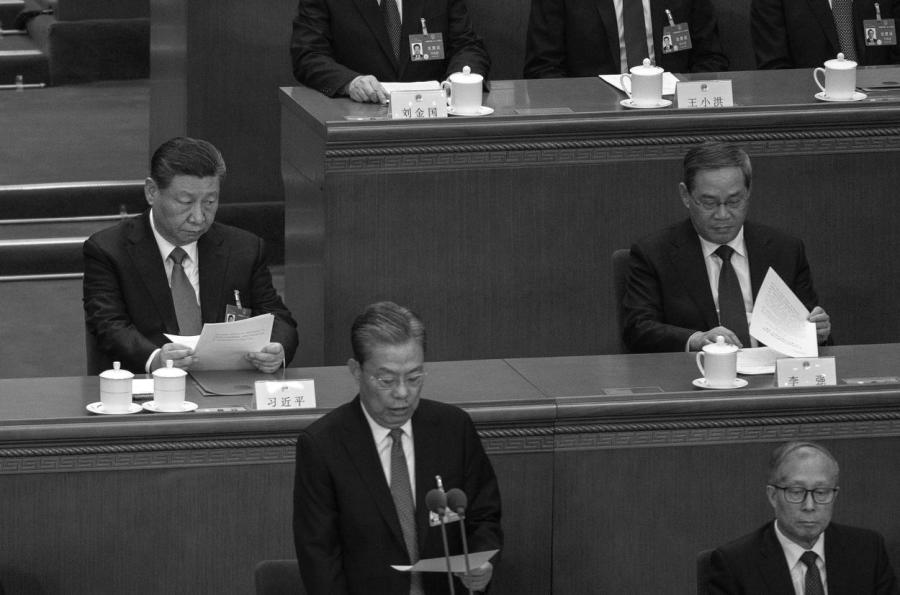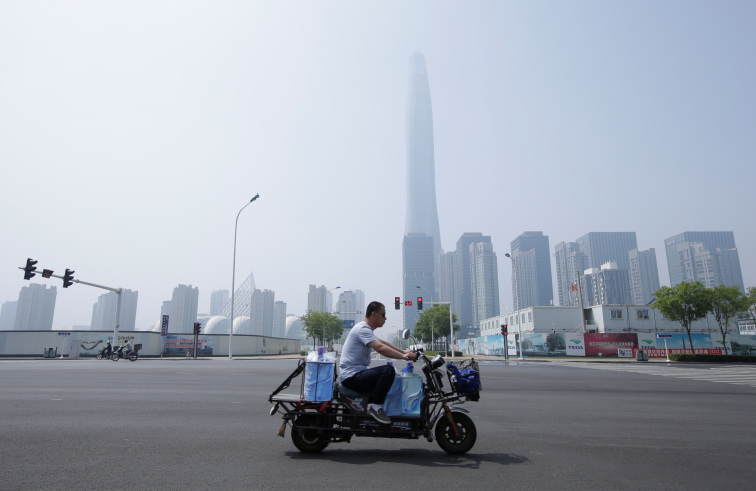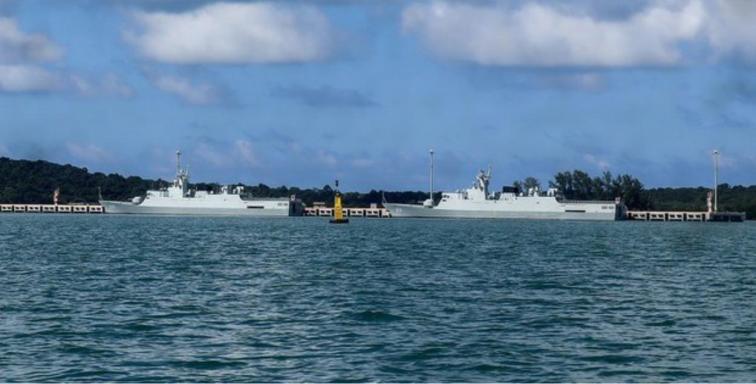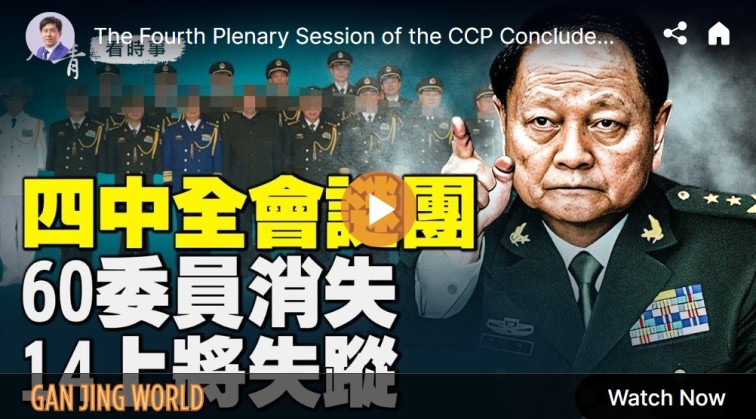File photo: Chinese Communist Party leader Xi Jinping and Premier Li Qiang (right) at the closing meeting of the National People's Congress in the Great Hall of the People. (Photo by Kevin Frayer/Getty Images)
[People News] Recently, Jiang Chaoliang, former Party Secretary of Hubei, was officially expelled from the CCP and public office, while Xu Dazhe, former Party Secretary of Hunan, was removed from his post as a deputy to the National People’s Congress (NPC). The downfall of the two powerful provincial leaders — both from the “Two Lakes” (Hubei and Hunan) — suggests, according to analysts, that after purging the top ranks of the Central Military Commission to tighten his control over the center, Xi Jinping is now moving to further consolidate his personal authority in the provinces, laying the groundwork for the 21st Party Congress two years from now.
Former Hunan Party Secretary Stripped of NPC Status
On October 28, the Standing Committee of the 14th National People’s Congress concluded its meeting in Beijing, announcing a list of officials whose NPC deputy qualifications were terminated. Among them was Xu Dazhe, former Party Secretary of Hunan.
In CCP political language, “being removed” (bei bamen) and “agreeing to resign” (tongyi ciqu) have vastly different meanings. The former usually signals that the individual is about to face trial and imprisonment — a designation for “enemies.” The latter is a polite way to step down, suggesting potential leniency or quiet retirement. For instance, the same announcement on October 28 stated that Wang Xiqin, former President of Tsinghua University, and Wang Xinyu, former Mayor of Jinzhou, Liaoning, were allowed to resign from their NPC positions — implying peaceful exits and early retirements.
Now 69 years old, Xu Dazhe began his career in China’s aerospace system. He served as General Manager of the China Aerospace Science and Industry Corporation (CASIC), Vice Minister of Industry and Information Technology, and Director of the State Administration of Science, Technology and Industry for National Defense (SASTIND). In 2016, he parachuted into Hunan as Governor; in 2020, he became the province’s Party Secretary. Since October 2021, he has served as Deputy Chair of the 13th and 14th NPC Education, Science, Culture, and Health Committees.
It is noteworthy that several senior executives of China’s aerospace sector have already fallen in recent years. Whether Xu was implicated by those investigations or part of a linked corruption network “nest case” remains unclear.
Xu had already been absent from several key meetings since late 2024. Rumors circulated online that he was taken away by the Central Commission for Discipline Inspection (CCDI) while inspecting Loudi, Hunan.
Former Hubei Party Secretary Expelled from the CCP
Just one day earlier, on October 27, the CCP announced that three “tigers” (senior officials) had been expelled from the Party — including Jiang Chaoliang, former Party Secretary of Hubei. His case has been transferred to prosecutors for criminal investigation.
Jiang was accused of engaging in “superstitious activities,” “greed and corruption,” and other such charges — typical pretexts in CCP disciplinary jargon. However, independent reports claim that he knew too many secrets about the early outbreak of COVID-19 (the CCP virus) at the Wuhan Institute of Virology.
It is said that Jiang once complained at a private dinner that the massive number of deaths during the pandemic had made him a scapegoat for Xi’s central leadership. When he realized his situation was precarious, he allegedly tried to flee abroad in disguise but was intercepted en route.
Jiang was appointed Hubei Party Secretary in October 2016. When the COVID-19 outbreak began at the end of 2019, Hubei’s Party leadership and the CCP initially concealed the epidemic, missing the crucial window for containment, and later mishandled the crisis once it exploded. To appease public anger, the CCP announced on February 13, 2020, that Jiang was removed from all provincial positions. Within a month, he was also stripped of his roles as Chairman of the Hubei People’s Congress and First Secretary of the Provincial Military District Committee. Many observers at the time believed Jiang had been made a scapegoat for the pandemic.
Later, in a “rumor-busting” gesture, the CCP quietly announced that Jiang was serving as Deputy Chair of the Agriculture and Rural Affairs Committee of the 13th and 14th NPC Standing Committees — a sign he had seemingly been “sidelined, not punished.”
Yet, five years later, the CCP abruptly reopened his case, labeling him a “tiger” and taking him down again. Reports indicate that this time Jiang fell because he “leaked Party secrets.”
Independent commentator Cai Shenkun revealed that in 2024, during a dinner with a vice-minister-level official, Jiang spoke bluntly about the pandemic: that the Wuhan outbreak, lockdown, and the treatment of Dr. Li Wenliang were all “personally directed and deployed by the Central Committee — specifically by Xi Jinping himself.”
The other official, realizing the political weight of Jiang’s words, feared that staying silent would mean career suicide. Reporting Jiang, however, could mean “meritorious service.” He chose the latter — and Jiang was soon denounced.
The central authorities had already been displeased with Jiang, since he had previously stated in internal meetings that “all epidemic reports and lockdown decisions in Hubei and Wuhan must be submitted to and executed strictly according to central directives.” That sealed his fate.
Sensing danger, Jiang reportedly planned to flee to Thailand during the 2024 Lunar New Year and expose the CCP’s secrets in exchange for international asylum. But the plot was detected by CCP intelligence agents, and he was arrested before he could escape.
Xi Tightens His Grip — Laying Groundwork for the 21st Party Congress
It’s no secret that Xi has long been dissatisfied with many regional leaders. Those who “discuss the Central Committee irresponsibly,” act as “two-faced men,” or shift allegiances are viewed as obstacles to the endless extension of Xi’s rule and ideology.
At this year’s Fourth Plenary Session, nearly 60 of the CCP’s 376 full and alternate Central Committee members were absent. Many of them are now under disciplinary investigation as part of Xi’s ongoing purge. Alongside Jiang Chaoliang, two other officials were expelled on the same day: Lu Wenjun, former Party Committee member and Deputy General Manager of China First Heavy Industries, and Zhang Jianhua, former Deputy Director of the SASTIND.
Why does Xi continue to purge even his own appointees? After more than a decade in power, nearly all current senior officials rose under his leadership. Why risk damaging his own reputation by purging them?
According to an analysis in The Wall Street Journal, Xi’s relentless purges have drastically reduced the number of power players in Beijing, further centralizing authority in his own hands. The report cited Neil Thomas, a China analyst at the Asia Society Policy Institute, who said:
“Xi has accelerated the pace of purging high-level officials during his current term because he now firmly controls elite politics. This allows him to freely advance his vision of the CCP’s ‘self-restraint and self-purification’ without relying on Western-style rule of law.”
Professor Zhang Tianliang of Feitian Academy analyzed on his media channel When the Sky Brightens that Xi’s arrests — both in the central government and local administrations — are meant to ensure that his political thought remains unchallenged.
Zhang explained that because of Xi’s age and health, he likely wishes to transition into a behind-the-scenes role — directing policy and preserving his energy while ruling through committees and working groups loyal to him. In this scenario, he does not need to fill every official position, only ensure that those in key bodies faithfully implement “Xi Jinping Thought.”
Zhang remarked:
“The more vacancies below, the easier it is to manage from above. By continuously removing people from both central and local governments, Xi is preparing for the personnel layout of the 21st Party Congress. He’s clearly aiming for a fourth and even fifth term. The communiqué of the Fourth Plenary Session already hinted that ‘Xi Jinping Thought’ will guide China until 2035 or even 2049.”
Current affairs commentator Li Linyi added that internal CCP struggles continue, and the Xi faction and anti-Xi factions have yet to fully face off. The widespread collapse of the Party’s internal stability shows that the regime has entered an unprecedented crisis.
Taiwanese scholar Wu Se-chih also wrote recently in Newtalk that with internal CCP power struggles and worsening socioeconomic instability, the period following the Fourth Plenary Session will likely see even deeper internal friction and stagnation within the CCP.
(First published by People News) △











News magazine bootstrap themes!
I like this themes, fast loading and look profesional
Thank you Carlos!
You're welcome!
Please support me with give positive rating!
Yes Sure!